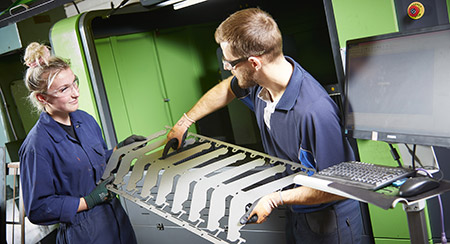News
Toolmaking explained: What is it? And why might you need our specialist skills
By Kevin Batty, General Manager
Toolmaking is an art.
It requires knowledge, skill and a methodical approach.
It also helps if you have a passion for making things and inquisitive nature for how things work.
Despite the fact Paragon Tools has been in existence since 1969, we still get asked a couple of questions on a very frequent basis:
What is a toolmaker?
And what does a toolmaker actually do?
What is a toolmaker?
The short version:
A toolmaker is a highly-skilled engineer who makes the precision tools which manufacturers use to create their parts or products.
The in-depth toolmaker definition:
A toolmaker is a highly-skilled engineer who is responsible for making precision tools, dies, moulds, jigs, holding devices and guides. These are used to make the manufacturing process easier when making products or the parts for products, in the most efficient way possible.
The materials that a toolmaker works with are usually metals or specialist alloys. But can also include a wide range of none ferrous materials such as plastic and brass and copper alloys.
A toolmaker works in a machinist shop, where they use conventional and specialist computer-controlled machinery (CNC) as well as traditional hand tools to manufacture highly-accurate tool components.
As well as supporting the production of new tools, they are responsible for repairing, maintaining and improving tools, when required.
What does a toolmaker do?
A toolmaker’s job is varied and they will eventually acquire a solid understanding of several different technical production processes.
A typical toolmaker’s role and responsibilities include:
- Using 2D & 3D computer aided design (CAD) software
- Working to detailed engineering drawings
- Following engineered drawings to mark out tool components
- Using traditional lathes and milling machines to cut and shape parts
- Operating computer numerically controlled (CNC) machines
- Using hand tools to fine finish machined parts
- Using precision measurements to check tool dimensions
- Monitoring tool efficiency – waste and run rates etc
- Identifying and implement any possible improvements
- Assembling finished parts
- Testing and adjusting completed tools to produce desired finished product
What skills do toolmakers need?
At Paragon Tools, we are committed to continually investing in our staff development. However, it is important for our people to have a good academic grounding.
The key skills toolmakers require include:
- Good hand-eye co-ordination
- Excellent attention to detail
- Ability to work independently and with a team
- Excellent skills in maths and IT
- Good communication skills
- Able to handle responsibility
- High concentration levels
- Ability to work out how things work
- Solution-focused approach
- Think innovatively and methodically
- Enjoy being creative
- Able to find solutions to problems
- Determination to succeed
How do you become a toolmaker?
To pursue a toolmaking career, you need a GCSE in maths, English and Science (Grade 4 to 9) and be willing to work towards a Level 3 diploma. The most popular ways to get into the industry is through a specially-tailored apprenticeship.
At Paragon Tools, we are proud that just over 60 per cent of our current workforce came through our own apprenticeship scheme, which is run in partnership with Hull Training and Humberside Engineering Training Association Ltd (HETA).
However, every member of our staff did start their working life as an apprentice before joining us.
There are also a variety of college courses available which can prepare people for life as a toolmaker. But in my opinion, the apprenticeship route is the best way to build up practical hands-on skills at the same time as acquiring the necessary technical knowledge.
Who might need the skills of a toolmaker?
If you need to make an essential part but you don’t know how to do it, we’re the toolmakers for you!
Our expertise is relied upon by SMEs and big-name global organisations because we take care of the entire process – from concept and prototype to design and manufacture.
Since 1969, parts that have been manufactured by our tools have been used by Jaguar, Rolls Royce, Land Rover, Siemens, Aston Martin, Ideal Boilers, Volvo, BMW, and many more.
Most toolmaking projects start with a specific requirement (or problem) and our specialist skills are required to find the most appropriate solution. Sometimes I liken the role to that of a detective because of the need to think methodically and analyse various outcomes until you arrive at the right result.
You can quickly acquire the necessary skills and knowledge, but the actual art of toolmaking is perfected over a lifetime.
Whether you need a small single operation die, a transfer tool or a large multi-stage progression tool; we have the knowledge and ability to successfully carry out the job.
To discover if we can make the tool you need, upload your design and we’ll do the rest!
Our experienced and highly-skilled engineers will evaluate its form, fit and function and help you determine how to make it.
If you’d like talk about your project in detail, please call 01482 497777 for an informal discussion.

Paragon Tools
321 National Avenue
Kingston upon Hull
HU5 4JB
United Kingdom
Contact
Company Registration Number: 16843484